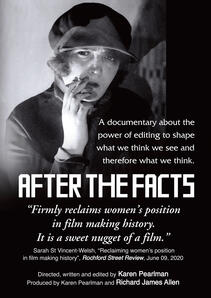Shop for a film
AFTER THE FACTS
Year: 2018
Classification: Exempt - Ronin Recommends: G
Runtime: 5 min
Produced In: Australia
Directed By: Karen Pearlman, ASE
Produced By: Richard James Allen
Language: English
Website: physicaltv.com.au/
In the early years of cinema, editors were usually women. This short documentary by Karen Pearlman ASE looks at how they wielded power, and how their work was made invisible.
After the facts is about the power of film editing and the women in early film who revolutionised it. This award-winning short film playfully reveals how juxtaposition of different film 'facts' (documentary images) can shape the viewer's thoughts and understandings differently. It demonstrates the kinds of juxtapositions that are often called 'the Kuleshov effect', after Lev Kuleshov, the Soviet film teacher in the 1920s, who conducted experiments that showed how such editing effects worked. But After the facts asks: why is something that lots of women and editors were already doing named after one man who observed them doing it? In After the facts, Pearlman reclaims and re-names this innovation that is so central to how screen stories work. She calls it 'The Editor's Effect'.
VIEW TRAILER HERE: vimeo.com/953884506
Available on DVD as part of An Editor's Anthology (3 short films by Karen Pearlman). See www.roninfilms.com.au/video/858/0/18585.html for further details about the anthology.
Available as a separate digital file for screenings and streaming.
This short documentary is part of Dr Karen Pearlman's ongoing research, which is interrogating the standard film histories and bringing to light the significant and overlooked contributions made by women editors.
Directed, Written and Edited by Karen Pearlman ASE
Screen Dramaturge: Kathryn Millard
Music: Caitlin Yeo
Producers: Karen Pearlman and Richard James Allen
Awards
Winner, Best Editing, Open Content, 2018 Australian Screen Editors (ASE) Guild Awards
Winner, Best Female Editor, 2021 Toronto International Women Film Festival
Reviews
'In After the facts we have what feminist film theory never achieved in the 1970s - a theory of women's editing practice. ... After the Facts stimulates the field, challenges it to return women to the top, taking as its premise that to start with "women in the early industry" is to transform motion picture filmmaking as a historical field. If we start with the women who worked, especially in the Soviet revolutionary society, surprise, surprise—everything looks different...What we have here is "theoretical research" on the historical film text. After the Facts demonstrates nothing more nor less than a new theory and practice of historical research—no traditional "fact-finding."' - Jane M. Gaines, review at Women Film Pioneers Project, 2020: wfpp.columbia.edu/2020/03/16/after-the-facts/
'After the facts at first adopts a familiar documentary style to discuss Esfir Shub's work and aspirations. She wanted to make a film about women, and a film capturing the rhythm of work, and though she worked on and made many films, Shub's aspirations (and those of her colleagues Svilova and Vertov) were unable to continue to be realised under Stalin's regime, we can only imagine and reflect on what she left behind in her archive that infers what else might have been, in different circumstances. Pearlman helps us do that. Pearlman's reflexive and daring handling of her own thoughts, editing thoughts, rendered in montage and compilation, are an ecstatic conclusion to her observations and arguments throughout the film. It firmly reclaims women's position in film making history. It is a sweet nugget of a film.' - Sarah St Vincent-Welsh, "Reclaiming women's position in film making history", Rochford Street Review, June 09, 2020:
rochfordstreetreview.com/2020/06/09/flashes-of-thoughts-and-emotions-sarah-st-vincent-welch-reviews-three-films-by-karen-pearlman/
'After the facts is the shortest of the trio at only five minutes. The film is, in some ways, a commentary on the other two [films in the trilogy]—exploring the importance of editing, not just in film but in how it can impact the way we perceive reality. The film demonstrates its thesis artistically: the camera panning from a woman looking to what she sees, and finally, to what she thinks. This is done by utilising Esfir Schub's archive of "facts" to create a "remix" that moves between historical image, modern story, and an engaging lecture on the power and importance of editing.' - Magdalena Ball, "A review of Karen Pearlman's Woman with an editing bench, After the facts, and I want to make a film about women", Compulsive Reader, August 9, 2020: www.compulsivereader.com/2020/08/09/a-review-of-karen-pearlmans-woman-with-an-editing-bench-after-the-facts-and-i-want-to-make-a-film-about-women/

